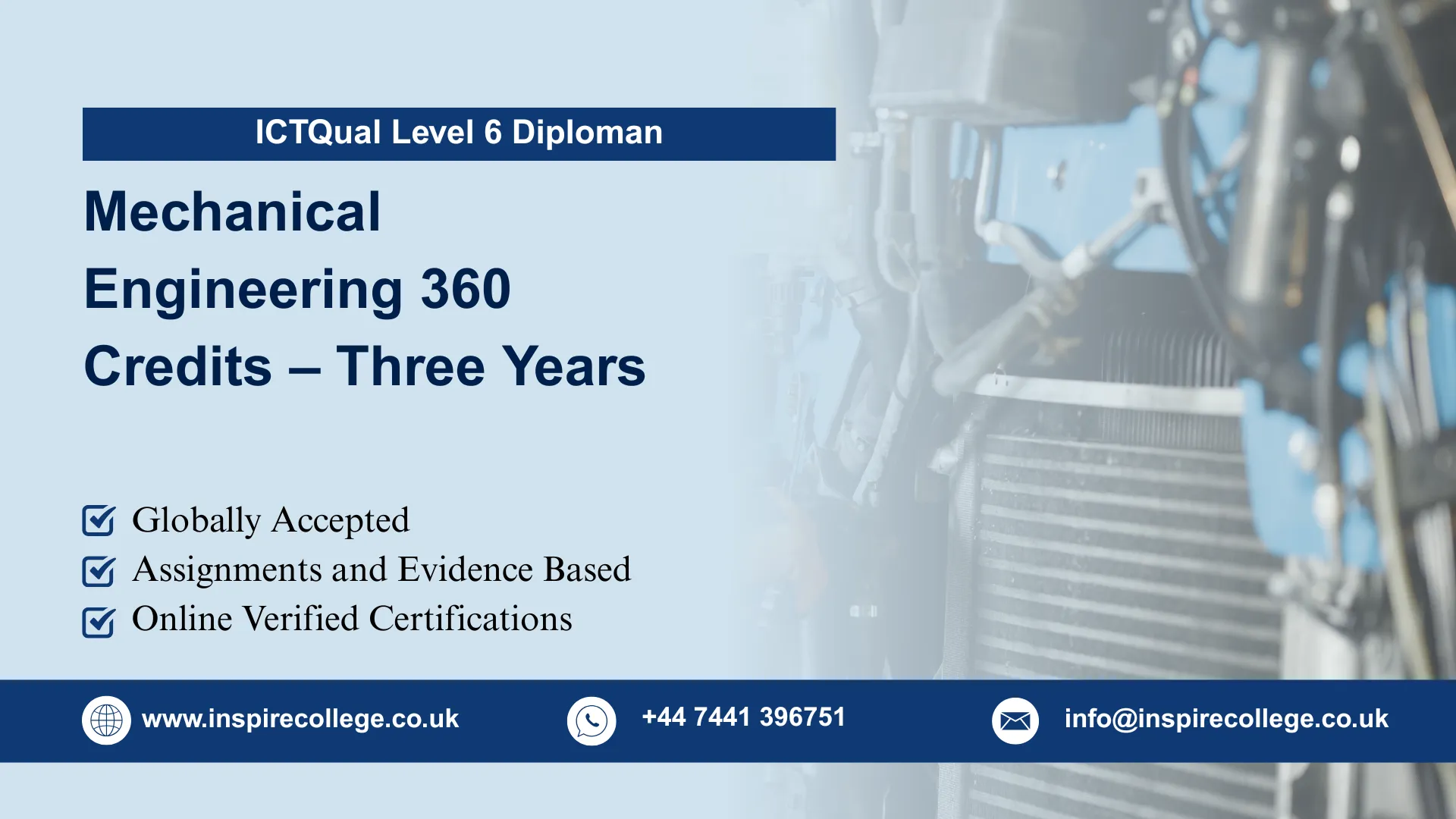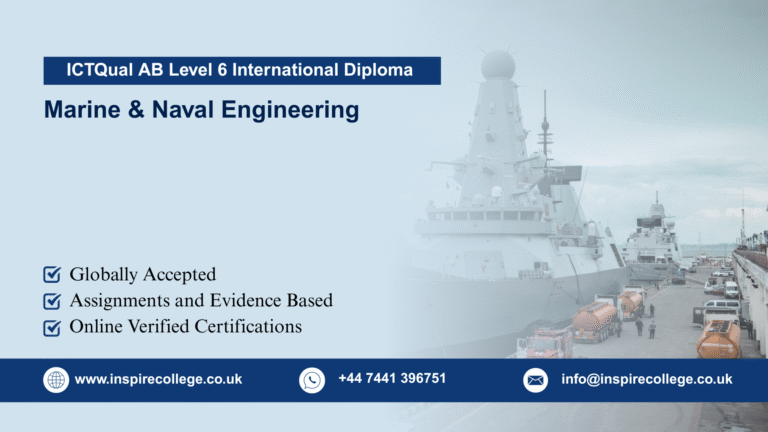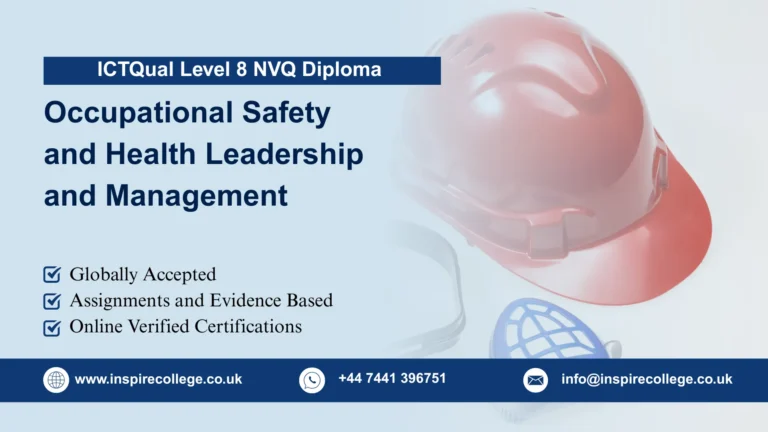
ICTQual Level 6 Diploma in Mechanical Engineering 360 Credits – Three Years
The ICTQual Level 6 Diploma in Mechanical Engineering is a comprehensive program designed to equip learners with advanced knowledge and practical skills in the dynamic field of mechanical engineering. Mechanical engineering forms the backbone of modern industry, from manufacturing and automotive to robotics, energy systems, and aerospace technologies. This diploma is ideal for both freshers seeking a strong foundation and professionals aiming to enhance their technical expertise and career prospects.
Spanning three years and carrying 360 credits, this program provides a structured pathway to mastering key mechanical engineering principles, including thermodynamics, fluid mechanics, materials science, mechanical design, manufacturing processes, and automation. Learners will develop critical problem-solving abilities, analytical thinking, and technical competence, preparing them to address real-world engineering challenges.
The curriculum emphasizes practical application alongside theoretical knowledge. Students engage in hands-on laboratory experiments, computer-aided design (CAD) projects, simulations, and industrial case studies. These experiences ensure learners can design, analyze, and optimize mechanical systems efficiently and safely. Additionally, the program incorporates project management, sustainability practices, and ethical engineering considerations, enabling graduates to work confidently in multidisciplinary teams and leadership roles.
By completing the ICTQual Level 6 Diploma in Mechanical Engineering, learners achieve a globally recognized qualification that opens doors to advanced career opportunities, specialized technical roles, and higher education pathways. Graduates will emerge as skilled, innovative, and adaptable professionals, ready to contribute effectively to engineering projects, industrial operations, and technological advancements worldwide.
The ICTQual Level 6 Diploma in Mechanical Engineering is designed to ensure learners possess the foundational knowledge, skills, and competencies required for success in this advanced program. Meeting the entry requirements ensures learners are well-prepared to engage with both theoretical concepts and practical applications across mechanical engineering disciplines.
Age Requirements
- Applicants must be at least 18 years old at the time of enrolment.
Educational Requirements
- Completion of a Level 5 or equivalent diploma in Mechanical Engineering or related technical fields.
- Strong mathematics and physics background is recommended.
- Fresh graduates should have completed secondary education (A-levels, high school diploma, or equivalent) with STEM-related subjects.
Professional Experience
- Professionals with 2–3 years of verifiable work experience in mechanical engineering, manufacturing, or related industries may be eligible for direct enrolment.
- Practical experience in industrial or commercial mechanical systems is advantageous but not mandatory for fresh learners.
English Language Proficiency
- Applicants whose first language is not English must demonstrate proficiency through recognized tests such as IELTS (minimum 5.5 overall), TOEFL, or equivalent.
- Competency in technical reading, writing, and communication in English is essential for successful course completion.
By meeting these entry requirements, learners will be well-positioned to fully engage with the ICTQual Level 6 Diploma in Mechanical Engineering, acquire advanced technical expertise, and pursue rewarding career opportunities in the global mechanical engineering sector.
Mandatory Units
This qualification, the ICTQual Level 6 Diploma in Mechanical Engineering 360 Credits – Three Years, consists of 36 mandatory units.
Year 1: Foundation and Core Engineering Principles
- Mathematics for Engineering
- Engineering Principles
- Materials Science and Engineering
- Engineering Drawing and CAD
- Statics and Dynamics
- Introduction to Thermodynamics
- Manufacturing Processes
- Fluid Mechanics
- Electrical and Electronic Systems for Engineers
- Engineering Mathematics for Design
- Mechanical Design Fundamentals
- Engineering Project Management
Year 2: Advanced Engineering Concepts and Applications
- Advanced Thermodynamics
- Strength of Materials
- Heat Transfer and Fluid Dynamics
- Advanced Manufacturing Techniques
- Mechanical Vibrations and Acoustics
- Engineering Dynamics and Control
- Design and Analysis of Machine Elements
- Control Systems for Mechanical Engineering
- Engineering Materials and Failure Analysis
- Computer-Aided Engineering (CAE)
- Mechanical System Design
- Project Planning and Cost Estimation
Year 3: Specialization and Practical Application
- Advanced Mechanical System Design
- Energy Systems and Sustainability
- Advanced CAD and 3D Modeling
- Finite Element Analysis (FEA) for Mechanical Engineers
- Advanced Manufacturing and Robotics
- Mechatronics and Automation
- Engineering Research Methodology
- Industrial Engineering and Process Optimization
- Design for Manufacturability
- Professional Practice in Mechanical Engineering
- Engineering Innovation and Entrepreneurship
- Capstone Project/Thesis
The ICTQual Level 6 Diploma in Mechanical Engineering is designed to develop learners into competent, skilled, and innovative mechanical engineers. Throughout this three-year program, students gain advanced theoretical knowledge, practical skills, and professional competencies, preparing them for diverse roles in engineering, manufacturing, automation, and research.
Year 1: Foundation and Core Engineering Principles
Mathematics for Engineering
- Apply calculus, algebra, and differential equations to solve engineering problems.
- Develop analytical and quantitative reasoning skills for mechanical applications.
- Use mathematical tools to model and analyze engineering systems.
- Perform accurate calculations for design and operational scenarios.
Engineering Principles
- Understand fundamental engineering concepts across mechanics, thermodynamics, and materials.
- Apply principles to solve basic engineering challenges.
- Evaluate the behavior of mechanical systems under various conditions.
- Develop problem-solving and critical thinking skills.
Materials Science and Engineering
- Identify and classify engineering materials based on properties and applications.
- Evaluate material selection for mechanical components.
- Conduct basic tests to assess material performance.
- Apply materials knowledge in design and manufacturing processes.
Engineering Drawing and CAD
- Produce accurate technical drawings following engineering standards.
- Use CAD software to design mechanical components and assemblies.
- Interpret engineering schematics for practical applications.
- Translate conceptual designs into precise visual representations.
Statics and Dynamics
- Analyze forces and moments in static and dynamic systems.
- Apply Newtonian mechanics to solve engineering problems.
- Evaluate equilibrium and motion in mechanical structures.
- Perform practical calculations for system stability and dynamics.
Introduction to Thermodynamics
- Understand laws of thermodynamics and energy conversion principles.
- Analyze thermodynamic systems for efficiency and performance.
- Apply basic heat transfer concepts to mechanical applications.
- Solve practical energy-related problems in engineering contexts.
Manufacturing Processes
- Identify and apply key manufacturing techniques and methods.
- Evaluate suitability of processes for different materials and products.
- Conduct basic experiments in manufacturing and fabrication.
- Develop skills in workshop practices and process optimization.
Fluid Mechanics
- Analyze fluid behavior in various mechanical systems.
- Apply principles of flow, pressure, and hydraulics in engineering design.
- Solve practical problems related to pumps, pipes, and fluid machinery.
- Use computational tools for fluid analysis.
Electrical and Electronic Systems for Engineers
- Understand basic electrical and electronic principles for mechanical engineers.
- Apply concepts of circuits, power, and instrumentation in mechanical applications.
- Conduct simple experiments and measurements in labs.
- Integrate electrical systems in mechanical designs.
Engineering Mathematics for Design
- Apply advanced mathematical methods for mechanical system modeling.
- Use numerical techniques for problem-solving.
- Interpret and analyze data for design optimization.
- Develop mathematical models to support engineering decisions.
Mechanical Design Fundamentals
- Understand principles of mechanical design and component selection.
- Analyze stress, strain, and load distribution in simple components.
- Apply design standards and codes in mechanical systems.
- Produce basic design documentation and drawings.
Engineering Project Management
- Understand project planning, scheduling, and resource allocation.
- Apply risk assessment and quality management principles.
- Use project management tools for engineering projects.
- Develop skills for teamwork and project execution.
Year 2: Advanced Engineering Concepts and Applications
Advanced Thermodynamics
- Analyze complex thermodynamic systems and cycles.
- Evaluate energy conversion efficiency in mechanical systems.
- Apply thermodynamic principles in practical engineering solutions.
- Use software tools for thermodynamic modeling.
Strength of Materials
- Analyze stress, strain, and deformation in mechanical components.
- Evaluate material performance under different loading conditions.
- Solve problems related to beams, shafts, and structural elements.
- Apply safety factors and design criteria in practical applications.
Heat Transfer and Fluid Dynamics
- Evaluate conduction, convection, and radiation in thermal systems.
- Analyze fluid flow in pipes, pumps, and machinery.
- Apply heat transfer principles in mechanical designs.
- Use computational tools to simulate thermal and fluid systems.
Advanced Manufacturing Techniques
- Understand modern manufacturing methods, including additive manufacturing.
- Apply advanced machining and fabrication techniques.
- Evaluate cost, quality, and efficiency in manufacturing processes.
- Conduct experiments to improve production methods.
Mechanical Vibrations and Acoustics
- Analyze free and forced vibrations in mechanical systems.
- Apply vibration control methods in engineering design.
- Evaluate acoustic properties of materials and systems.
- Use simulation tools to study vibration and noise.
Engineering Dynamics and Control
- Model dynamic mechanical systems for analysis and control.
- Apply feedback control principles to mechanical applications.
- Evaluate system stability and performance.
- Implement control solutions in practical scenarios.
Design and Analysis of Machine Elements
- Analyze gears, bearings, shafts, and other machine components.
- Apply design standards for mechanical reliability.
- Conduct failure analysis and optimize component design.
- Use CAD and CAE tools for machine element design.
Control Systems for Mechanical Engineering
- Design and analyze control systems for mechanical processes.
- Implement PID and modern control strategies.
- Evaluate system performance using simulations.
- Apply control methods to automation and robotics.
Engineering Materials and Failure Analysis
- Assess material performance under mechanical and thermal stress.
- Conduct failure investigations to identify root causes.
- Recommend materials and designs to prevent failures.
- Apply knowledge in safety-critical mechanical systems.
Computer-Aided Engineering (CAE)
- Use CAE tools for design, simulation, and optimization.
- Analyze stress, thermal, and fluid flow using software.
- Interpret simulation results for design improvements.
- Integrate CAE practices into engineering projects.
Mechanical System Design
- Design mechanical systems considering functionality, safety, and efficiency.
- Apply analytical and computational methods in design.
- Optimize systems for cost and performance.
- Document and present design solutions effectively.
Project Planning and Cost Estimation
- Develop comprehensive project plans for mechanical engineering projects.
- Estimate costs, resources, and timelines accurately.
- Apply project management principles in practical contexts.
- Use planning tools to monitor project progress.
Year 3: Specialization and Practical Application
Advanced Mechanical System Design
- Develop complex mechanical systems using advanced design methodologies.
- Optimize components for strength, efficiency, and reliability.
- Conduct practical design projects integrating theory and application.
- Use simulation and modeling tools for system validation.
Energy Systems and Sustainability
- Analyze conventional and renewable energy systems.
- Evaluate energy efficiency and environmental impact.
- Design sustainable mechanical solutions for industry applications.
- Apply sustainability principles in project planning and execution.
Advanced CAD and 3D Modeling
- Create detailed 3D models for mechanical components and assemblies.
- Use CAD software for design validation and simulation.
- Generate technical documentation for manufacturing.
- Apply parametric and surface modeling techniques.
Finite Element Analysis (FEA) for Mechanical Engineers
- Model mechanical components for stress, strain, and thermal analysis.
- Interpret FEA results for design improvement.
- Apply FEA tools to real-world engineering problems.
- Validate designs against performance standards.
Advanced Manufacturing and Robotics
- Implement robotic systems in production and automation.
- Optimize advanced manufacturing processes for quality and efficiency.
- Apply automation techniques in mechanical operations.
- Conduct practical experiments integrating robotics in manufacturing.
Mechatronics and Automation
- Design integrated mechanical, electronic, and control systems.
- Apply sensors, actuators, and controllers in practical applications.
- Evaluate system performance and reliability.
- Implement automation solutions in industrial settings.
Engineering Research Methodology
- Develop research proposals and conduct engineering investigations.
- Apply quantitative and qualitative research techniques.
- Analyze and interpret data to support engineering conclusions.
- Communicate research findings through reports and presentations.
Industrial Engineering and Process Optimization
- Analyze industrial processes for efficiency and productivity improvements.
- Apply lean manufacturing, Six Sigma, and optimization techniques.
- Conduct workflow and process analysis for engineering systems.
- Implement solutions to enhance operational performance.
Design for Manufacturability
- Integrate design considerations with manufacturing constraints.
- Optimize product designs for cost, quality, and production efficiency.
- Evaluate manufacturability using simulations and prototyping.
- Apply standards and best practices for industrial production.
Professional Practice in Mechanical Engineering
- Understand ethical, legal, and professional responsibilities.
- Develop leadership and teamwork skills for engineering projects.
- Apply project management and safety practices in professional settings.
- Engage in continuous professional development.
Engineering Innovation and Entrepreneurship
- Identify opportunities for innovation in mechanical engineering.
- Develop business and project proposals for engineering ventures.
- Apply creative problem-solving techniques in design and manufacturing.
- Integrate technical knowledge with entrepreneurial thinking.
Capstone Project/Thesis
- Plan, execute, and document a comprehensive mechanical engineering project.
- Apply theoretical knowledge to practical, real-world challenges.
- Demonstrate problem-solving, design, and project management skills.
- Present and defend project outcomes professionally.
Upon completing all 36 units, learners will possess advanced mechanical engineering knowledge, practical expertise in design, manufacturing, and automation, and professional competencies to excel in industry, research, and higher education. Graduates will emerge as innovative, skilled, and globally competitive engineers.
The ICTQual Level 6 Diploma in Mechanical Engineering is designed for learners who are motivated, technically minded, and eager to develop advanced skills in mechanical engineering. This program is suitable for both freshers and professionals aiming to excel in engineering careers or higher studies.
Fresh Graduates and STEM Students
- Individuals who have completed secondary education, A-levels, or a Level 5 diploma in mechanical or related engineering fields.
- Learners seeking a structured and comprehensive pathway to acquire advanced mechanical engineering knowledge.
Early-Career Professionals
- Professionals with 2–3 years of experience in mechanical engineering, manufacturing, or industrial operations.
- Those aiming to enhance technical, design, and project management skills to progress in their careers.
Practical and Application-Focused Learners
- Individuals interested in hands-on projects, simulations, laboratory work, and real-world problem solving.
- Learners who wish to apply theoretical knowledge to mechanical design, manufacturing, and automation projects.
Innovation and Sustainability-Minded Engineers
- Learners committed to sustainable engineering practices and ethical professional conduct.
- Individuals seeking to integrate innovative solutions into mechanical and industrial applications.
Aspiring Leaders and Entrepreneurs
- Candidates aiming to take leadership roles in engineering projects or multidisciplinary teams.
- Learners interested in entrepreneurial initiatives and innovation within the mechanical engineering sector.
This diploma program prepares learners to become skilled, confident, and globally competitive mechanical engineers, capable of contributing effectively to diverse industrial, research, and technological environments.
We are an approved centre of ICTQual AB, and all learners must enrol with us to pursue the ICTQual Level 6 Diploma in Electrical Engineering 360 Credits – Three Years. The program offers tailored certification routes for both experienced professionals and fresh candidates to suit different backgrounds and learning needs.
Route for Experienced Professionals
- Applicants must have at least 6 years of verifiable experience in electrical engineering, electronics, or related technical roles
- Submit a detailed portfolio demonstrating professional achievements and relevant work experience
- Attend an orientation session to understand course structure, requirements, and assessments
- Complete a set of targeted assignments focusing on the application of prior experience and technical knowledge
- Participate in practical assessments or project evaluations where applicable
- Upon successful assessment, receive the ICTQual Level 6 Diploma in Electrical Engineering
Route for Fresh Candidates
- Fresh learners or those without significant professional experience must enrol and complete all 36 assignments
- Attend lectures, practical sessions, and laboratory workshops over the three-year program
- Complete projects, case studies, and technical exercises to develop theoretical and practical knowledge
- Undergo regular assessments, exams, and practical evaluations throughout the program
- Submit a capstone project demonstrating comprehensive understanding and application of course content
- Receive the ICTQual Level 6 Diploma in Electrical Engineering upon successful completion
Both certification routes provide learners with a globally recognized qualification that equips them with technical, practical, and managerial competencies. Graduates gain expertise in electrical circuits, power systems, embedded systems, automation, control systems, and project management, preparing them for leadership roles and specialized engineering careers worldwide.
Register Now
FAQs for ICTQual Level 6 Diploma in Mechanical Engineering






